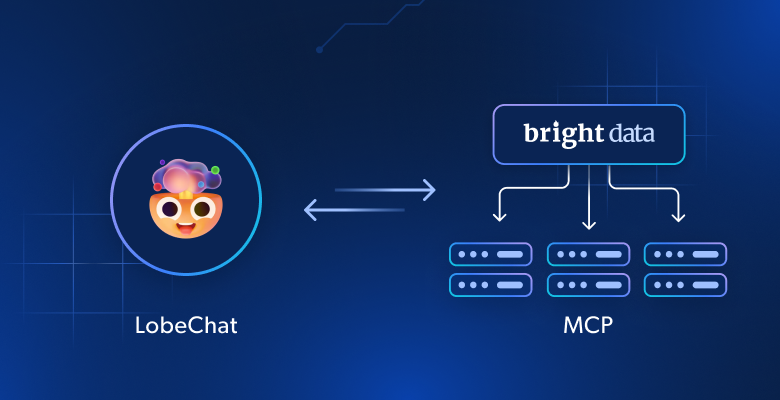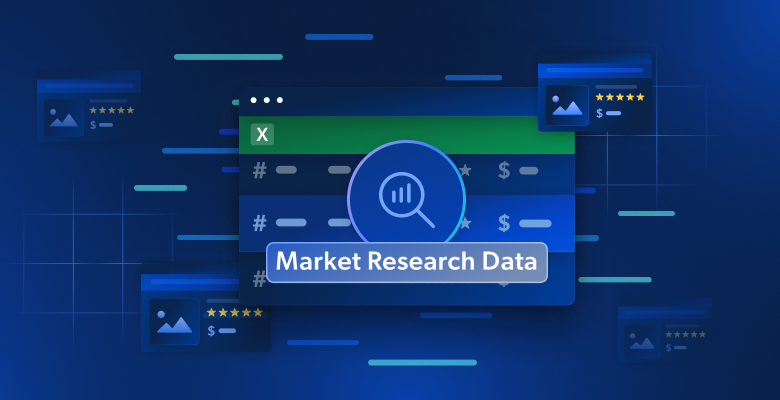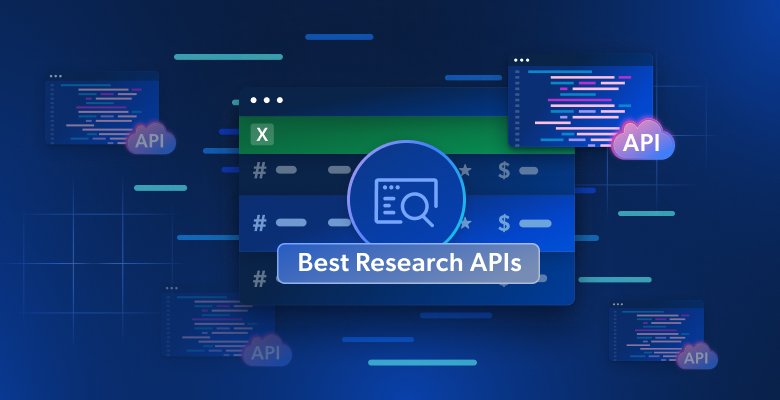In this guide, you will learn:
- What LobeChat is and what makes it special.
- Why you should extend LobeChat assistants using MCP.
- How to connect a LobeChat assistant to Bright Data’s Web MCP server via a remote connection.
Let’s dive in!
What Is LobeChat?
LobeChat is an open-source LLM chat platform with a user-friendly design. As a desktop app, it integrates with leading AI models like OpenAI, Gemini, and Claude to deliver an improved chat experience directly on your computer. More recently, it has also become available as a progressive web app you can access in your browser.
On GitHub, LobeChat boasts over 66k stars:

That statistic makes it one of the most popular AI chat platforms. Its open-source foundation emphasizes security and trust, while also opening the door to a customizable experience.
LobeChat serves as a versatile AI assistant and conversation management hub, where you can manage and switch between multiple AI models within a single interface. On top of that, its plugin system extends functionality via MCP integration.
Main Features
The main capabilities offered by LobeChat include:
- Multimodal interactions, allowing you to communicate using text, voice, and images for richer, more intuitive conversations.
- AI companions (called “assistants”) that you can create, customize, and switch between anytime.
- A simple, chat-like interface that is as easy to use as a regular messaging app.
- An agent marketplace to build and manage your own AI ensemble with an intuitive editor.
- A plugin ecosystem that extends your agent’s abilities with tools for search, finance, gaming, academia, and more.
- Knowledge and memory integration to connect knowledge bases and help your agents learn and improve over time.
- Visual recognition to upload images and have the system analyze and explain them.
- Generative AI support for creating images, audio, and videos using tools like DALL·E, MidJourney, and Sora.
- Voice features enabling real-time conversations and customization of your agent’s voice.
- Model flexibility to connect with top global LLMs such as GPT, Claude, and Gemini, and choose your preferred model.
Benefits of Connecting to Bright Data’s Web MCP in LobeChat
LobeChat supports MCP integration, giving your assistants access to tools that the underlying LLM can call directly while addressing prompts. This is especially useful because LLMs alone cannot do it all.
Thanks to LobeChat’s model-agnostic design, MCP integration lets you build assistants that can leverage a wide range of tools in the chat. This is particularly valuable for overcoming one of the main limitations of any LLM: static knowledge.
LLMs are trained on data representing a snapshot in time, meaning their knowledge can quickly become outdated. More importantly, they cannot natively interact with the Web or external data sources. Or, even if they can, they are generally blocked by anti-bot solutions.
This is where LobeChat’s plugin system, powered by MCP, makes all the difference. For example, by connecting to Bright Data’s Web MCP, your AI assistant can retrieve fresh, high-quality data directly from the web.
Web MCP provides access to over 60 AI-ready tools, all powered by Bright Data’s infrastructure for web data. You can install the MCP server locally via the open-source package or access it remotely via Bright Data’s servers.
Even on the free tier, Bright Data’s Web MCP exposes two essential tools:
| Tool | Description |
|---|---|
scrape_as_markdown |
Scrape any webpage into clean Markdown format, bypassing bot detection and CAPTCHAs. |
search_engine |
Retrieve search results from Google, Bing, or Yandex in JSON or Markdown. |
Beyond these free tools, Web MCP unlocks dozens of specialized tools for structured data collection across platforms such as Amazon, LinkedIn, Instagram, and more. Discover all available tools!
Thus, combining LobeChat with Web MCP transforms static chats into dynamic assistants that can access real-time web data, generate insights grounded in the current world, and perform tasks on web pages on your behalf.
How to Connect LobeChat to the Remote Web MCP Server from Bright Data
In this step-by-step section, you will see how to connect a LobeChat assistant to the Bright Data Web MCP remotely.
Now, why connect remotely instead of running @brightdata/mcp locally in a terminal? The reason is that LobeChat works as both a desktop and a web application. Still, the web app only supports remote connections to MCP servers. So, to keep this tutorial broadly applicable, we will focus on configuring Web MCP via a remote URL.
If you are using the desktop version and prefer a local setup, that is also possible—and not too complicated. In fact, in that case, you could directly take advantage of the LobeChat Bright Data MCP plugin.
Follow the instructions below!
Prerequisites
Before getting started, make sure you have:
- A LobeChat account (even a free trial account will work).
- A Bright Data account, with an API key configured (you’ll learn how to set it up later).
It is also important to have some knowledge of the following concepts:
- How MCP works.
- The differences between Streamable HTTP, SSE, and STDIO.
- How the remote option for Web MCP works.
Step #1: Get Started with LobeChat
Log in to your LobeChat account, and reach the LobeHub. This is what you should see:

Here, you will:
- Configure the MCP plugin.
- Create a custom plugin that connects to the remote Web MCP server.
- Add a new assistant.
- Enable the custom Web MCP plugin in the assistant.
- Chat with your enhanced assistant.
See how in the steps below!
Step #2: Configure the MCP Plugin
For all information on MCP configuration in LobeChat, refer to the official blog post. Otherwise, follow the guided instructions below.
Start by clicking the plugin icon in the bottom toolbar of the LobeHub interface. Then, select the “Plugin Store” option:

In the “Plugin Store” modal that will show up, press the “Add MCP Plugin” button:

Great! This will start the MCP plugin definition in LobeChat. Specifically, you will be able to define a custom plugin to connect to a local or remote MCP server. The tools provided by the server will then be available in your assistant by enabling this custom plugin.
Step #3: Get the Web MCP Connection URL
Before proceeding with the MCP plugin definition, you need to retrieve the Web MCP connection URL. This will require a Bright Data API key, which will be used to authenticate the connection to the remote Web MCP server. Follow the official guide to generate your Bright Data API token.
Important: For a simplified setup, the API key should have Admin permissions. That way, your Bright Data account will automatically be configured with all the required products by Web MCP, as shown below:

For more information, consult the Web MCP documentation page. Considering also visiting the “MCP” quick setup page in your account:

You will see that the Web MCP remote connection URL is:
https://mcp.brightdata.com/mcp?token=<YOUR_BRIGHT_DATA_API_KEY>Replace <YOUR_BRIGHT_DATA_API_KEY> with your Bright Data API key.
Remember: By default, you will have access only to the search_engine and scrape_as_markdown tools (including their batch versions). That is possible thanks to the Web MCP free tier.
To access all advanced tools offered by the Web MCP for web data feeds, browser interaction, and more, enable Pro mode by adding &pro=1 to the URL:
https://mcp.brightdata.com/mcp?token=<YOUR_BRIGHT_DATA_API_KEY>&pro=1This will give you access to 60+ tools, but keep in mind that usage in Pro mode will incur costs.
Amazing! You now have everything you need to set up Bright Data Web MCP in LobeChat.
Step #4: Connect to the Remote Web MCP Server
Back in LobeChat, after pressing the “Add MCP Plugin” button, you will see the “Add Custom Plugin” view below:

Start by selecting the connection method to your MCP server. Choose “Streamable HTTP” for a remote connection. Then, give your MCP plugin a name (e.g., “BrightData”) and paste your Web MCP connection URL:

Click “Test Connection” to verify that LobeChat can reach the Web MCP. If everything works as expected, you will see these four tools (available in the free tier):

Or, in Pro mode (with &pro=1), you will get 60+ tools:

Once the connection is verified, click “Install Plugin” to create your custom Bright Data Web MCP plugin:

Back in the “Plugin Store” modal, under the “Installed” tab, you should now see your custom BrightData plugin:

Fantastic! Web MCP integration is complete. You are now ready to use the plugin in a new LobeChat assistant.
Step #5: Create and Configure a New Assistant
Back to the LobeHub, click the “New Assistant” button to create a new LobeChat AI assistant:

This is what you should see:

You can now configure your assistant by changing the underlying LLM and other options. For example, switch the model from GPT-5 Mini (default) to Gemini 2.5 Flash by clicking the gpt-5-mini label next to the assistant’s name and selecting your preferred model:

Your assistant will now be powered by Gemini 2.5 Flash.
As of this writing, LobeChat offers a generous free trial with 450,000 credits for GPT, Claude, and Gemini models. So, you do not need to worry about costs right away. For production assistants, however, you will need a premium plan.
Done! You now have a LobeChat assistant enhanced with Bright Data Web MCP tools.
Step #6: Integrate Bright Data’s Web MCP in the Assistant
In your assistant, press the Plugin button and enable the “BrightData” plugin by checking it:

Terrific! Your assistant now has access to all the tools exposed by the remote Web MCP.
Step #7: Test the Integration
Normally, you would want to build a set of custom agents, each responsible for a specific part of a task and relying on different MCP tools. However, thanks to LobeChat’s ChatGPT-like experience, you can just split the task into several prompts and take advantage of the chat’s context capabilities.
For example, assume you are a startup that needs to purchase a database client. You have already narrowed the selection down to DbVisualizer, DBeaver, and DataGrip (arguably, three of the most popular database clients out there).
What you want now is to make a decision based on pricing, since as a startup, every dollar counts. The idea is to ask the LLM to retrieve information from each product’s pricing page and then make a final recommendation based on that data.
Start by asking it to scrape the DbVisualizer pricing page and return a detailed report:
Produce a summary with the main information from the following pricing page:
https://www.dbvis.com/pricing/
Include a table with all pricing plans and a bulleted list highlighting the key details I should be aware of.Paste the prompt into your assistant and execute it:

This is what happened behind the scenes:
- Gemini created a plan to execute your request.
- It recognized that it first needed to scrape the page content using the
scrape_as_markdowntool from the “BrightData” plugin. - It ran the plugin with the correct argument (the pricing page URL from the prompt) and retrieved the content in Markdown format.
- It analyzed the content and produced a report containing the requested data.
Verify the use of Bright Data’s Web MCP scrape_as_markdown tool in the debugging info provided by LobeChat before the actual response:

Now, repeat the same process for the DBeaver and DataGrip pricing pages. Your chat will then include all three reports, which you can also access in the future, as LobeChat assistants store the last 20 messages by default.
Important: The outputs are accurate because the assistant can now scrape any website on the fly using the scrape_as_markdown tool powered by Bright Data’s Web Unlocker. Similarly, it can search the web through the search_engine tool, backed by Bright Data’s SERP API.
Finally, complete the task with a decision-making prompt like this:
We're a startup with database management needs across multiple databases. I want the best value option that also provides access to premium features and strong customer support. We’re willing to invest in the right solution. Based on the information you gathered earlier, which of DbVisualizer, DBeaver, or DataGrip would you recommend for my needs?Run it in your assistant:

Your Gemini-powered assistant in LobeChat will analyze the previously scraped data via Web MCP and provide a comparison of the three database clients. This is the output you should expect:

The final recommendation produced by the assistant, based on the scraped data, is that DbVisualizer is the best fit for your needs, with DataGrip being a close second:

Et voilà! You just demonstrated how powerful your LobeChat assistant has become thanks to Bright Data’s Web MCP integration.
Note: What you just did would take much more time without the Web MCP integration. The LLM alone would not be able to access web page content directly, meaning you would have to pass it manually. That could be a problem if the content is too long for the LLM to process. Instead, you got everything you needed without ever leaving the chat. That is incredibly convenient!
Now, by changing the prompts, use your assistant to cover many other use cases.
Conclusion
In this blog post, you learned how to create an augmented AI chat experience in LobeChat by integrating it with Bright Data’s Web MCP (which now comes with a free tier!). This integration equips your assistant with capabilities such as web search, data extraction, and real-time web interaction.
To build even more advanced AI chatbots, explore the wider range of products and services within Bright Data’s AI infrastructure. These solutions are built to support diverse AI workflows and a variety of chatbot use cases.
Sign up for a free Bright Data account and start playing with our AI-ready web data products!





